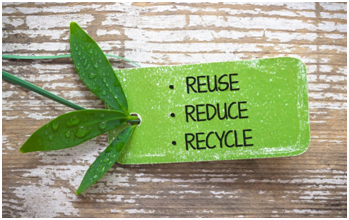3 Amazing Ways To Reduce Your Waste and Lower Your Rubbish Clearance

Clearabee, an on demand rubbish clearance company, has become known throughout England for their ecofriendly business ethics and services. Although they make a profit from clearing rubbish from homes and businesses, one of their core missions is to educate people on how to reduce their waste. Below, you’ll learn about three highly effective ways you and your family can reduce your waste. Please help spread this important information far and wide by sharing this link on social media, forums, and websites.
1. Grow Your Own Food
Growing your own food is one of the best ways to reduce your need for rubbish clearance and keep waste out of our landfills. According to a study conducted by Tesco, the largest grocery store in the UK and the third most profitable retailer in the world, sixty-eight percent of all bagged salad greens ends up being wasted! While much of it ends up expiring before consumers even buy it, about one-third of it gets tossed into the rubbish clearance pile at home or by restaurants. Of coarse, with that food waste also goes the packaging materials straight into our landfills!
Food waste is a much more significant environmental problem than you may think. According to the United Nation’s Food and Agriculture Organization, discarded uneaten food, rotting in landfills, is third biggest greenhouse gas emitter after the United States and China, i.e. the impact is enormous. This is because rotting food produces 3.3 billion tonnes of methane gas which contributes more than carbon dioxide to the greenhouse effect. Rotting food also takes up approximately 1.4 billion hectares of agricultural land worldwide and it degrades our rivers, streams, lakes and other natural bodies of water as it runs off and or seeps into the ground water.
Growing greens at home means you pick just what you need when you need it and there is no packaging! Voila — zero waste, especially if you compost (see below). And… there’s more good news. It is really easy to grow your own healthy leafy greens, even with no previous gardening experience or skill! Brassica greens, including various types of kale, cabbage, collards, and mustard greens, are among the easiest plants in the world to grow. Other green leafy vegetables like chard, spinach, lettuce, and herbs are virtually “foolproof” as well. Plus, you only need a small space to grow enough leafy greens and herbs for your entire family to enjoy these healthy vegetables every day, with some left over to share with neighbors and friends.
If you need help getting started, talk to the plant nursery where you buy your seeds or starts. You can also post questions to local forums and you’ll get lots of responses from gardeners in your same growing region. Gardeners tend to be friendly people who love to share what they know. Once you develop confidence in growing leafy greens, you’ll be ready to branch out and grow a wider variety of vegetables — or maybe even plant a fruit tree or raise some chickens for fresh eggs!
2. Composting
According to Move For Hunger, a non-profit that gathers and distributes food to food banks, an average home in the United States and Canada can divert about 150 kilograms (about 330 pounds) of food waste a year from landfills by composting food scraps! To give you a rough idea, forty pounds of food composted will make the equivalent of one big bag of nice rich organic soil you can use to grow your own food and beautiful flowers of course. This means an average home could generate more than eight bags of organic soil from food scraps. At the same time, this would help lessen the greenhouse effect, lower the impact to our natural bodies of water, and reduce the plastic in landfills. Plus, it’s a really fun thing to do with the kids and it will lessen your rubbish clearance bill.
3. Shopping For Used Or Refurbished Products
The stronger we make the marketplace for used items, the more effort will be put into reselling and upcycling items like clothing, curtains, tablecloths, toys, bikes, appliances, televisions, furniture, etc. So, every chance you can, try to buy used and refurbished products. You can shop at dress agencies (consignment stores), vintage clothing stores, charity shops, second hand stores (resale shops), jumble sales, car boots, bazaars, used appliance stores, used electronic stores, and swap shops. You can use CraigsList and Facebook groups to find reclaimed building supplies. You could even salvage building supplies from demolition sites before all of those valuable materials are destroyed and taken to the landfill!
To make this fun, you can turn it into a contest. Get the kids, your whole extended family, and your network of friends out looking for bargains. Who can find the best deal on a used product? Who can save the most from being tipped in a landfill? You may even want to try freeshops or the “free” section on CraigsList to get the “deal of a century!” Remember too, Clearabee makes a special effort take items from rubbish clearance jobs to places where they will be reused and upcycled.